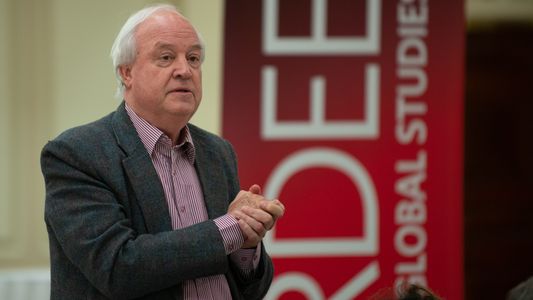Heine Underscores Importance of International Dialogue in TV Interview
Ambassador Jorge Heine of the Pardee School was invited to an episode of “Dialogue,” a CGTN’s talk show to discuss the recognition of June 10 as the International Day for Dialogue among Civilizations. Proposed by China and adopted by the UN General Assembly last year, this annual occasion signifies the growing importance of international dialogue in an increasingly contentious world, aiming to promote trust, solidarity, connectivity, and cooperation among nations.

Speaking of this latest addition to the UN calendar, Heine stressed that it’s critical to practice international dialogue as the world is experiencing a difficult moment, reminding viewers of the poly crisis that came about in the form of COVID-19, economic downturns, and major armed conflicts in Ukraine, Gaza, and Sudan in the last five years. In the face of such challenges, the professor asserted that the international leadership should explore various channels to talk to one another in a bid to find solutions that work for all.
“What is very important here is to provide formats, provide venues, frameworks within which dialogue can proceed. I have been associated with public policy think tanks for most of my professional life and there [are] think tanks that bring together, you know, politicians and government officials with thinkers and analysts. I think if done well that can be a very fruitful undertaking because you bring together the people that actually do things, that implement policy with those that have been devoting their lives to thinking about how to make a better world.” – Ambassador Jorge Heine
When asked about the recent immigration policy ostracizing Chinese students, Heine mentioned the scale of travel between the United States and China before the pandemic — emphasizing the impact of these exchanges and how they were and are integral for collective progress.
What is very important here is people-to-people exchanges. You know we can talk about, you know, state level issues and macroeconomic questions, but in the end what makes the world go around is whether people understand each other or not. – Ambassador Jorge Heine
Heine also said that though there are parallels between the Cold War and the U.S.-China rivalry, unlike the Soviet Union, China is a bigger and open economy, significantly contributing to global GDP. Countries in the developing world now have an option of collaborating with either of the superpowers on projects. This new reality also makes the premise of the ambassador’s new book The Non-Aligned World: Striking Out in an Era of Great Power Competition (2025) that provides insights on how the Global South can navigate the changing diplomacy landscape amid the U.S.-China tensions.

Professor Heine’s complete interview on “Dialogue” can be accessed here.
Jorge Heine is a research professor at the Frederick S. Pardee School of Global Studies. A diplomat, international relations scholar, and lawyer, he served as an ambassador of Chile to China, India, and South Africa. At the moment, he is a non-resident senior research fellow at the Centre for China and Globalization (CCG) in Beijing and has has been a consultant to the United Nations, the Ford Foundation, the Canadian Ministry of Foreign Affairs, the Trinidad & Tobago Ministry of External Affairs, Oxford Analytica and Frost & Sullivan.